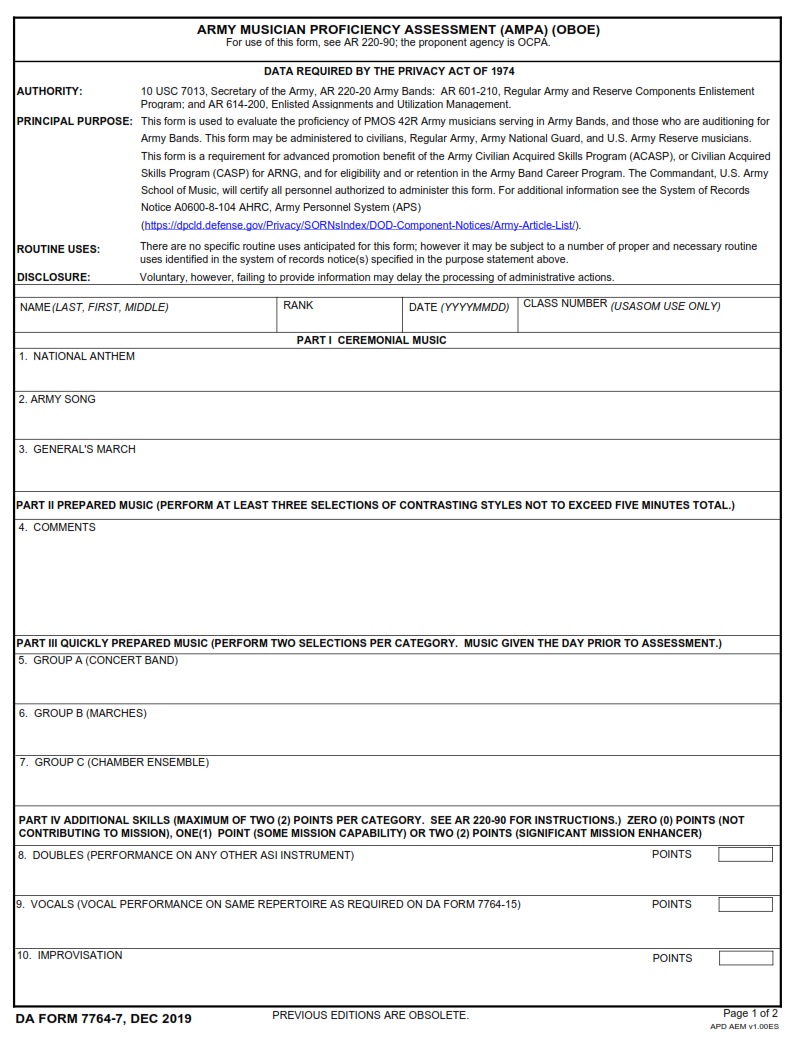DAFORMFILLABLE.COM | DA FORM 7764-7 Fillable – Army Pubs 7764-7 PDF – DA FORM 7764-7, officially titled Army Musician Proficiency Assessment (AMPA) (Oboe), is an essential document for evaluating the proficiency of oboe players within the U.S. Army. Released on December 1, 2019, this form is an active publication managed by the Office of the Chief of Public Affairs (OCPA). This article aims to provide a comprehensive overview of DA FORM 7764-7, highlighting its importance, structure, and usage within the Army’s musical assessment framework.
DA FORM 7764-7 – Army Musician Proficiency Assessment (AMPA) (Oboe)
| Form Number | DA FORM 7764-7 |
| Form Title | Army Musician Proficiency Assessment (AMPA) (Oboe) |
| Form Date | 12/1/2019 |
| Form Proponent | OCPA |
Overview of DA FORM 7764-7
Purpose and Importance
The Army Musician Proficiency Assessment (AMPA) is designed to assess the musical skills and proficiency of Army musicians. Specifically, DA FORM 7764-7 focuses on oboe players, ensuring that they meet the required standards to perform effectively within military bands and ensembles. This form is crucial for maintaining the high standards of musical performance expected in the Army.
Publication Details
- Pub/Form Number: DA FORM 7764-7
- Pub/Form Date: 12/01/2019
- Pub/Form Title: Army Musician Proficiency Assessment (AMPA) (Oboe)
- Pub/Form Proponent: OCPA
- Pub/Form Status: Active
- Prescribed Forms/Prescribing Directive: AR 220-90
- Superseded/Replaced Other Pub/Form: Revised DA FORM 7764-7, 10/01/2016
- Security Classification: Unclassified
- Distribution Restriction Code: A Approved for Public Release; Distribution is Unlimited
Structure and Components of DA FORM 7764-7
Assessment Criteria
DA FORM 7764-7 evaluates oboe players on various performance criteria. These criteria are designed to test different aspects of musical proficiency, including technical skills, musical interpretation, and overall performance quality.
Sections of the Form
The form is divided into several sections, each focusing on a specific area of assessment:
- Personal Information: This section collects basic details about the musician, including name, rank, and unit.
- Performance Evaluation: This section includes detailed criteria for evaluating the musician’s performance on the oboe. It covers areas such as tone quality, intonation, rhythm, technique, and musicality.
- Scoring and Feedback: Evaluators use this section to provide scores and written feedback on the musician’s performance. This feedback is crucial for identifying strengths and areas for improvement.
- Summary and Recommendations: The final section summarizes the overall performance and includes recommendations for further development or actions based on the assessment results.
Utilization of DA FORM 7764-7
Who Uses the Form?
DA FORM 7764-7 is used by Army band directors, evaluators, and other authorized personnel responsible for assessing the proficiency of oboe players. It serves as a standardized tool to ensure consistent and fair evaluation across different units and commands.
Importance in Career Development
For oboe players in the Army, the AMPA is a critical component of their professional development. High scores on DA FORM 7764-7 can lead to opportunities for advanced training, special assignments, and career advancement within the Army’s music program.
Prescribing Directive: AR 220-90
The usage of DA FORM 7764-7 is governed by Army Regulation 220-90 (AR 220-90), which outlines the policies and procedures for Army music activities. This regulation ensures that the assessment process is standardized and aligns with the Army’s overall goals for musical excellence.
Conclusion
DA FORM 7764-7 – Army Musician Proficiency Assessment (AMPA) (Oboe) is a vital document for maintaining and enhancing the musical standards of oboe players in the U.S. Army. By providing a structured and comprehensive assessment framework, this form helps ensure that Army musicians possess the skills and proficiency required to perform at the highest levels. Understanding and utilizing DA FORM 7764-7 effectively is crucial for both evaluators and musicians in the Army’s music program.
